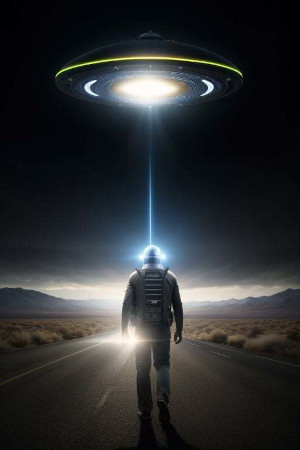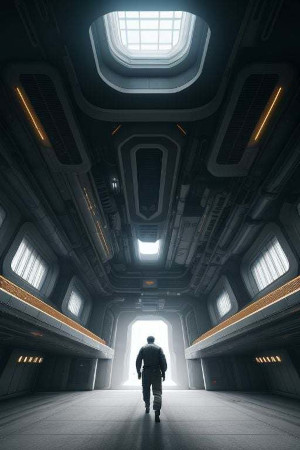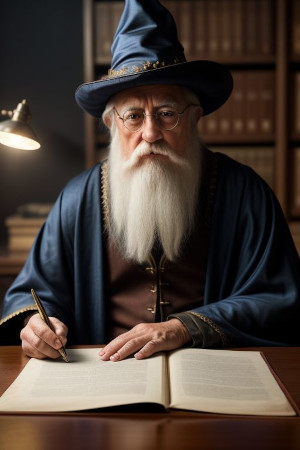2012
May
05
How Do You Define Science Fiction?
Science fiction might be a harder definition to pin down than we had thought. Of course, it's fiction about science, but what exactly does that mean? For a long time, I had a simple definition: science fiction is that fiction for which science is essential to the plot -- take out the science and the plot falls apart. Likewise, simply adding spaceships or other planets as a setting, or plasma rifles or tricorders as props, does not qualify it it as science fiction. If it did, prepending:
In the early days of Mars colonization, conditions demanded heavy reliance on technology. But as terraforming progressed, that reliance turned into a backlash, people yearning for a simpler time. Over the years, the colonists adapted their culture toward that of Victorian England, assuming the cobblestone, the dress, and the formality, even renaming their towns to match those on Earth. Unfortunately, they also returned to the same social injustices of that age, which had taken so many years for humankind to outgrow. It is upon that world that our story takes place.
to Oliver Twist suddenly makes it a science fiction novel because it takes place on Mars. I don't buy that.
Concomitant with that definition is my favorite example: Star Wars. Don't get me wrong; I'm something of a Star Wars fan, but I have a hard time thinking of it as science fiction. It's a standard fantasy quest plot line, where a small band of brave, unlikely heroes confronts and eventually defeats the overwhelmingly powerful and evil Lord Sauron ... oops, I mean Darth Sidius. Swords are now lightsabers and ships are now starships, but the identity of the hardware really is irrelevant to the overall plot.
I had a running feud with a young woman many years ago in a speculative fiction course. I argued that Star Wars was fantasy and Doctor Who was science fiction, and she argued exactly the opposite.
 One of my undergrad professors was Darren Harris-Fain. A good guy. In fact, I think I'll take this moment to plug his book: Understanding Contemporary American Science Fiction: The Age of Maturity, 1970-2000. I don't remember exactly how the conversation went, but it seems he received my definition with a degree of scepticism but didn't dismiss it outright.
One of my undergrad professors was Darren Harris-Fain. A good guy. In fact, I think I'll take this moment to plug his book: Understanding Contemporary American Science Fiction: The Age of Maturity, 1970-2000. I don't remember exactly how the conversation went, but it seems he received my definition with a degree of scepticism but didn't dismiss it outright.
A few days ago, I presented this definition on the SFF Chronicles forum. Another member, vastly my superior in number of posts -- a board moderator, actually -- argued that such a definition would exclude such classics as H. G. Wells' The Time Machine and Arthur C. Clarke's short story, "The Nine Billion Names of God". I mostly disagree. The Time Machine relies on the nature of time, the possibility of time travel, divergent evolution, and the long-term consequences of social stratification. It is science fiction. "The Nine Billion Names of God", however, is different, and requires more thought. Today, of course, computers are commonplace and the use of one to calculate permutations is no more science fiction than using a ball-point pen. But in 1953, when the story was written, computers were new, fantastic, and quite science-fictiony. The computer is the reason the monk's task is completed now instead of 15,000 years from now, and so figures prominently in the plot. Is it possible to be science fiction in 1953, and not in 2012? I think it best to stick with the definitions in place at the time a work was written. With that in mind, it, too, is science fiction, albeit perhaps marginally.
Nevertheless, that forum discussion caused me to reconsider my position. I thought at first that perhaps I was being too harsh, but I think instead that I was being too simplistic. It might be more a matter of degree, or of type. There are a number of manners in which science can be integrated into a story. and they each yield a different flavor.
Premise
To my mind, integrating science with the premise is the highest form of science fiction. An ideal example is The Thirteenth Floor, based on the novel Simulacron-3 by Daniel F. Galouye. Without the premise that simulated entities in a virtual reality are aware of their existence and environment, the plot totally disintegrates. You could pull out a few scenes and wedge them into a spy movie or film noir, but nothing coherent would remain of the original. The Matrix, on the other hand, though similar in concept, is less satisfying in that regard. Although some of the plot depends heavily on the premise, much of it stands independently. It is easy to see how a few parts of the plot could be reworked into a different premise. It would still be science fiction, of course, but the plot would not entirely fall apart by shifting its foundation.. I greatly preferred the former, but, hey, The Matrix had all those spectacular action sequences.
Plot:
This is where my thinking on the subject began. I suspect it dates all the way back to the '60s, when, as an early teen, I watched Star Trek faithfully. Even during the first season, I noticed that the plots of some episodes, such as "Space Seed" depended intrinsically on science, and others, such as, "The Conscience of the King", did not. I do not consider science to have been introduced into "Space Seed" at the premise level because the Übermensch meme has been around for a long time, probably predating Nietzsche, who coined the term, but the plot does rely on genetic engineering. "The Conscience of the King", however, could have taken place anywhere. It just happened to have been on a starship this time. I would consider the first to be science fiction, and the second something else.
Setting and Props
I'll just lump these two together. Any story has to transpire at some location and at some time. And it needs objects of some sort. Does it really matter what they are? Isn't John Carter just Tarzan on Mars? The Star Trek episode "Arena", also an Outer Limits episode of the same name are just gladiatorial combat. Much of the world accepts that setting and props are sufficient to render a story science fiction. I can't get myself to accept that they are necessary or in some cases even relevant to the overall story, or we would be getting back to the Martian version of Oliver Twist. On the other hand, the existence of those settings and props do rely on science in some way or another. We could not propose plasma rifles unless we knew about plasma.
Hence, my suspicion that I was oversimplifying. It's not just a matter of plot, but now a system of three dimensions, four if you want to separate setting and props, and five if you want to throw theme into the calculations. If we want to formulate this all into an equation, we would need a function of at least three variables and probably more. I was off base by thinking I could define the subject with only one.
Now for the punch line. The astute among you (and seeing that you are at least interested in science fiction, I predict that to be a majority) may see the flaw in all this reasoning. In case you missed it, the flaw is this: there can be a lot of variation between people in what they consider essential. Back to Star Wars. Does it matter that Luke went to Dagobah to meet Yoda? To me, that is no different from a young aspiring martial artist's going to Shanghai to find a kung fu master, and hardly sufficient to make the story science fiction. To you, the fact that Dagobah is a planet might make all the difference in the world. We'll probably agree that science in the premise makes it science fiction, possibly in the case of plots, and likely not in the case of setting and props. It largely boils down to the questions of to what degree of abstraction do we take the concept of "the plot" and how relevant we consider various "science" accoutrements.
So, in the end, I think I'll keep my definition, but from now on with the understanding that we might disagree on the meaning of essential. Is Avatar really just Dances with Wolves in another setting? Hopefully, we can agree that adding one paragraph about Mars is not essential to the plot of Oliver Twist and that it is insufficient to turn the story into science fiction.
How do you define science fiction?















Comments
There are no comments for this post.
You must be logged in to post a comment.